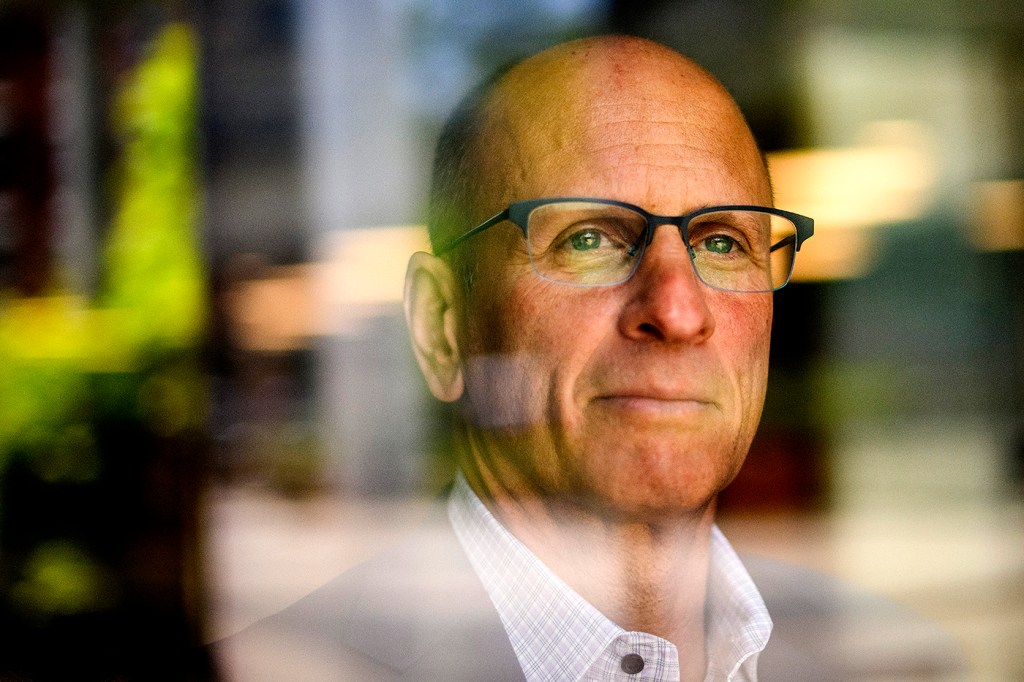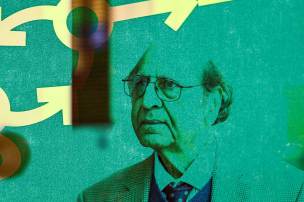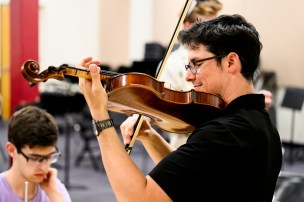Published on
From convicted gambler to devoted advocate: Harry Levant’s journey to save others
As a lawyer in Philadelphia, Levant stole close to $2 million from clients to feed his gambling addiction. Now he’s a Northeastern doctoral student pushing for federal legislation that treats betting as a public health issue.

Harry Levant turned to face his former client Donna Johnson. She had entered the courtroom in a wheelchair.
At one time they had been close. When Johnson sued for medical malpractice after her legs had been amputated in 2005, Levant had been the lawyer who procured a substantial settlement for her.
One decade later Johnson was back in court to testify at his sentencing hearing.
“Mr. Levant assured me that with his help, expertise and advice, my settlement would be invested wisely and my future would be financially secure,” Johnson says. “I admired him. I trusted him. I believed him and believed in him.
“I felt truly blessed to have such a dear friend in my life and felt I could always depend on him to be by my side both professionally as my lawyer and personally as my friend.”
Instead of investing her settlement, Levant stole the money and lost it gambling, Johnson told the court. He did the same with proceeds from the sale of her home, she testified.
“My world crumbled when I was informed that all of my money no longer existed,” Johnson says.
Over a two-year period culminating in 2014, Levant, a personal injury and criminal defense attorney in Philadelphia, had stolen close to $2 million from a dozen clients, friends or family members. He had gambled it all away.
Additional perspective at his sentencing hearing was offered by Susan Bennett, a relative of Levant’s at that time, whose divorce settlement had also been embezzled and lost by Levant at the betting tables. She had been forced to sell her home, leaving her in financial ruin and emotional anguish.
“Harry J. Levant has not only stolen money that took years and years of hard work and sacrifice to obtain, he has betrayed my trust and has stolen my future,” Bennett testified.
On Feb. 13, 2015, moments prior to being sentenced in Philadelphia on 13 counts of theft, Levant apologized to his many victims. They included his three children who, he says now, had saved him from taking his own life. Tears were streaming down his face as he addressed the judge.
“My name is Harry Levant and I’m a compulsive gambler,” he said. “Gambling addiction took control of my life and made my life unmanageable and caused irreparable harm for which I am solely responsible.
“I am left with two options,” Levant told the judge. “I can say that gambling addiction beat me. Or I can look that monster dead in the eye and take ownership of it and say I will make amends to this community.”
The prosecutor, while acknowledging that Levant had cooperated fully in every phase of his investigation, recommended a jail sentence in the neighborhood of two years. Instead Levant was sentenced to parole for no more than 23 months, to be followed by eight years of probation and an order that he repay his victims.
“I pledge to this court,” Levant said on the day he was granted a second chance, “that I will find a way to give back again by reaching other young adults so that they don’t ever have to look into the faces the way I just had to.”
Levant has devoted his reclaimed life to that mission.
Driven by his desire for healing and his hard-earned understanding of the harm caused by gambling disorder, Levant has become an internationally certified gambling addiction counselor and therapist who currently treats patients at Ethos Treatment Center in Philadelphia.
Additionally he is pursuing a professional doctorate in law and policy at Northeastern with a goal of researching the casualties of gambling addiction amid the ongoing explosion of online betting in the United States. Understanding the full scope of gambling disorder may compel Congress to regulate the gaming industry, Levant says.
To that end he is working with Northeastern’s Public Health Advocacy Institute (PHAI) and U.S. Rep. Paul Tonko to reframe gambling as an issue of public health, on the same level as tobacco, alcohol, opioids and other addictive products.
A ‘Wild West’ environment
Tonko recently introduced the “Betting on Our Future Act,” a bill that he hopes will begin a conversation within Congress to protect people who are vulnerable to gambling addiction — people like Levant.
“Harry Levant and the folks at PHAI have been critical in informing my work on this issue,” Tonko, a New York Democrat, told NGN. “Harry’s firsthand knowledge of just how destructive gambling addiction can be and his dedication to approaching the issue from a public health perspective is not only invaluable but unprecedented.”
Gambling has never been so accessible, argues Levant, and gamblers have never been so vulnerable. The gates were opened by a 2018 Supreme Court decision that has enabled 34 states and the District of Columbia to legalize online sports and casino gambling. A powerful coalition has been formed by online gambling sites partnering with states, sports leagues and media companies — all of them profiting at the expense of the betting public.
Americans have legally bet more than $220 billion on sports over the past five years, according to the American Gaming Association. Overall, U.S. casinos and online betting apps took in more than $60 billion last year alone, the association said.
“In the years since the Supreme Court legalized sports betting, unfettered advertisements have run rampant in a mostly unregulated, ‘Wild West’ environment, with betting companies shelling out billions to ensure they reach every screen across America,” says Tonko. “The incessant targeting and promotion of a known harmful product is no different than the heyday of Big Tobacco advertising — back when cigarette brands penned catchy slogans and sponsored popular television shows. Instead of Joe Camel, it’s celebrity spokespeople pushing so-called ‘risk-free’ bets.”
Northeastern’s Public Health Advocacy Institute was founded by University Distinguished Professor Richard Daynard, who helped lead the international fight that has forced the tobacco industry to take responsibility for the deaths, diseases and disabilities caused by its products. The PHAI has taken on issues of gun violence, obesity, opioids and e-cigarettes.
Daynard says the nascent marketing for sports betting has been more effective than the early campaigns for cigarette smoking of a century ago. Sports leagues that used to wall themselves off from betting now view gambling proceeds as a new form of income that can help replace revenues that may be lost as traditional TV broadcasts are replaced with streaming services that threaten to be less lucrative.
Close to $300 million was spent in 2022 on TV ads for sports gambling — a figure that promises to be eclipsed this year as current and former athletes join with other celebrities in promoting gambling sites and apps. A majority of states have partnered the rush to claim revenues — notwithstanding the harm that Levant says is sure to follow.
Levant notes that smartphone betting apps enable users to bet on each upcoming pitch of baseball games and every serve in tennis matches — a rate too fast for reasonable wagering. People who are addicted to gambling can be especially vulnerable to high-speed products.
“All of this is determined by AI because the gambling companies don’t have enough time to set the odds on each pitch,” Levant says. “If you’re betting on every pitch in baseball games, you are chasing action.”
Levant says the gambling companies have headed off federal regulation by urging customers to “gamble responsibly” while claiming that only 1% of gamblers experience addiction. Levant believes the number is much higher, based on studies in Australia, the United Kingdom, Finland and Spain showing that 13% or more of the general population suffers harm related to gambling.
“If those numbers are borne out in the U.S., it would mean millions of people are suffering horribly from harm related to gambling and gambling addiction,” Levant says. “But no one in America has ever looked at it from the public health perspective.”
Levant is using his Northeastern thesis to research the effects of gambling in order to provide Tonko and other government leaders with a factual basis for devising federal regulation.
“What brought me to Northeastern was the opportunity to put out research to examine the responsible gaming model,” Levant says. “The issue is what is the scope of public harm? Because for every person who struggles with gambling, a number of additional people in their orbit are impacted. And the magnitude of the suffering is not quantified in any way.”
Levant notes that the American Psychiatric Association in 2013 recognized gambling as an addictive product on the same level as heroin, opioids, cocaine, tobacco and alcohol. “The American Medical Association, the International Classification of Diseases, the World Health Organization — they all refer to gambling disorder as an addiction,” Levant notes. “There is no dispute about it.”
Awareness of the dangers of second-hand smoke helped feed public demand for regulations on the tobacco industry, Levant notes. Referring to his own story, he argues that gambling addiction affects innocent bystanders who are deceived and exploited by bettors who can’t help themselves.
“For each person who struggles with gambling, they are harming a significant number of additional people — their family members, their friends, their co-workers, their community,” Levant says. “We don’t have any handle in America on what the scope of public harm is.”
‘I was going to take my life’
In 2014, in a lavish Atlantic City oceanfront hotel room provided to him because he was such a reliable customer at the casino downstairs, Levant says he tried to write a suicide note to his three children.
He had arrived on a Thursday with an all-or-nothing plan to beat the house and replace the stolen funds.
“I was going to win back enough money to make this right,” Levant says. “Which was completely impossible. There was no way on this Earth that could have been done.”
Now it was late Saturday afternoon. The manic scheme had backfired. His losses had multiplied. He was at the end.
“I was going to take my life in that hotel room,” he says.
He had experienced many such revelations over the two years of his gambling addiction.
“For the addict, gambling addiction is not about money — it’s about the way the product makes you feel,” Levant says. “I would slap myself in the face saying, ‘Don’t gamble today.’ I would look in the mirror and beg myself, ‘Don’t do this.’ But you become powerless in the full-fledged grip of addiction.”
His fall had been precipitated by several life events: personal problems, the crumbling of his law practice and the death of his father, a former lawyer. “There were unresolved father-son issues that related directly to both the practice of law and a bond we shared over gambling,” says Levant, who had been betting since he was 12. “The pressure continued to mount. I was an out-of-work 40-something lawyer. At some point I did what many other people who are addicts do — I self-medicated with my drug of choice. And my drug of choice is gambling.”
The goal of gambling addicts is not to become rich, he insists.
“All addiction has an element of pain relief,” Levant says. “For someone caught in the grips of a pathological addiction, [the act of] gambling creates a euphoria. The euphoria that you feel is unsustainable, you wouldn’t wish it on your worst enemy. You don’t need food, you don’t need water, you don’t need sex, you barely need the air to breathe — what you need is your fix. That’s the cycle of addiction. That’s the dopamine effect on the brain. It is chemical and it is as real with gambling as it is with opioids. That cycle takes you to a place that you can’t get out of. And that high is part of a darkness that you don’t wish on anybody.”
In his role today as a treatment counselor in Philadelphia, Levant’s initial aim is to stop the “hemorrhaging” of his patients. “We use a group approach to help people find some connection to others,” he says, with the goal of widening their perspective beyond the ravenous need of the addiction.
For each person who struggles with gambling, they are harming a significant number of additional people — their family members, their friends, their co-workers, their community.
Harry Levant, an internationally certified gambling counselor and a doctoral student at Northeastern
On that Saturday afternoon nine years ago in Atlantic City, Levant realized another option.
“What snapped me out of it was trying to write the suicide note to my kids,” he says.
From the hotel room he phoned his brother, an attorney, who took him away from the hotel. After an extended stay at a rehabilitation clinic, Levant turned himself in.
“I went to the district attorney’s office in Philadelphia,” Levant says. “They didn’t know anything about what had happened. I wasn’t in a position to ask them for anything. But what I did say was, ‘After I’ve told you this story, I want you to charge me with anything and everything you can charge me with. Because if I’m ever going to have another day on the other side of this, I don’t want to have to look over my shoulder ever again.’”
At Levant’s 2015 sentencing hearing, defense attorney Tariq El-Shabazz says that his client had put together the case against him.
“I’ve been doing this 28 years — from both sides, as a district attorney and defense attorney — I have never, ever heard of anybody putting a case together prosecuting themselves,” says El-Shabazz, who added that Levant then approached the bar association to preemptively surrender his attorney’s license.
“Is there an area upon which someone can be rehabilitated?” El-Shabazz went on. “Do they show you a light or a glimmer of hope of their ability to rehabilitate themselves? … The first step of rehabilitation is admission.”
After being sentenced to parole and probation, Levant sought treatment for his addiction. After undergoing four years of therapy he applied for a master’s degree in professional clinical counseling at La Salle University. He explained his background to the program director, Donna Tonrey.
“It was one of the conversations that fundamentally changed the course of my life,” Levant says. “She said to me, ‘Your story is the least interesting thing about you.’ She said, ‘What’s really interesting is what you want to do with your story.’”
Minimizing the harm
“Harry has had a remarkable journey,” says Mark Gottlieb, executive director of Northeastern’s Public Health Advocacy Institute. “I don’t think there are any other voices in the United States that have been able to articulate the public health perspective around gambling as articulately as Harry — nor do they have the deep background and lived experience to bring it to life.”
Levant and the PHAI have been collaborating with Tonko, the first congressional leader to focus on the large number of casualties that he says will result from the widespread marketing of online gambling.
“Gambling is internationally recognized as an addictive product, and yet our nation’s laws and protections do not treat it as such,” Tonko told NGN. “Research has found a causal relationship between exposure to ads for gambling products or brands and greater intentions to gamble and increased gambling activity.”
Levant says the gambling industry utilizes a business model that he refers to as “AAC.” “They deliver access to action and get people chasing,” he says. “We have to change that model.”
He proposes a series of federal regulations including:
- Affordability checks. “We can set up guardrails that determine people’s wherewithal,” Levant says. “How often should they be able to make deposits into gambling accounts? If you make a deposit using a credit card, you’ve effectively borrowed money at [up to] 25% interest.”
- Advertising. “We have to closely examine gambling industry promotions and advertising — not from a First Amendment standpoint,” Levant says. “I’m not regulating speech. I’m not saying ‘ban gaming advertising.’ We’re talking about the fact that gambling is an addictive product.”
- Health care. “Insurance companies across the land do not provide the full range of coverage for gambling addiction — but they do for drug and alcohol addictions,” Levant says. “Congress, with one signing of the pen, could recognize gambling as a full-fledged addictive product.”
The histories of the U.S. cigarette, alcohol and opioid industries have shown that great public pain must be endured before Congress takes action, says Gottlieb.
“In the past it has required really incredible numbers and individual stories that put a face to the suffering,” Gottlieb says. “That combination has brought people to that ‘a-ha’ moment when they realize that something has to be done.”
In the meantime, fears Gottlieb, history is on the verge of being repeated by the escalation of legalized betting.
“In all of these situations,” Gottlieb says of cigarettes, alcohol and opioids, “the industries themselves were minimizing the harm to policymakers. Or they were saying, ‘We’ve got it under control. We realize there are some people who have problems with our products, but we have a whole program in place to minimize those harms. And so you don’t really have to worry about it.’”
Levant, Daynard and Gottlieb have been working on a presentation that Tonko has invited them to make before the congressional Addiction, Treatment, and Recovery Caucus on Thursday in Washington. Levant understands what is at stake.
“I treat people and families who are struggling with gambling disorder,” Levant says. “If I’m going to be in this business as a treater, I have a moral obligation to try and put myself out of business. It’s not just about fishing people out of the water when they’re drowning. What are we going to do to take a system that is fundamentally flawed and put some guardrails up so people don’t fall in the river in the first place?”
Ian Thomsen is a Northeastern Global News reporter. Email him at i.thomsen@northeastern.edu. Follow him on Twitter @IanatNU.





